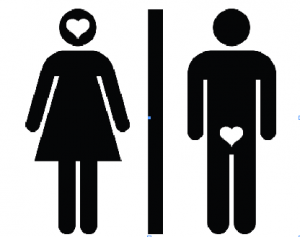Our generations perception of sex, dating, and relationships has strayed far away from the previous generations accepted norms. When it comes to college students, dating has shifted far from its historical connotation of a stable and steady relationship, to what it is viewed as today: a challenge or a game. The so-called “hookup culture” is merely a title created by the media labeling our generations new accepted sexual standards.
Justin R. Garcia of The Kinsey Institute of Research in Sex, Gender, and Reproduction at Indiana University-Bloomington defines hookups as, “brief uncommitted sexual encounters between individuals who are not romantic partners or dating each other.” Although the sheer number of casual sexual partners today’s youth boast of have not increased from past generations, the casual demeanor of the hookup culture has been on the rise. Conversations regarding casual sex are no longer taboo amongst students, as they once were. These conversations are increasingly common as this hook up culture permeates through college campus. The standards for sex, relationships, and dating will continue to loosen as the hookup culture continues on it current trajectory.
Sexualities portrayal in popular culture today has had a major impact on both how college social life is approached and how students behave themselves. Males are stereotyped to be casual about sex and now the uprising of the “hookup culture” has, in essence, granted permission for women to behave the same as well.
At Southern Methodist University, I have witnessed my friends and many others engaging in the hookup culture. Many people I associate with have in the past or are currently, “hooking up” with a male with something known as no strings attached. This no strings attached label implies hooking up for a long period of time without the commitment or label of boyfriend and girlfriend. With this said, specific labels are almost nonexistent for Generation-Y. Of course, I know people that are in committed relationships on campus and at other colleges. However, the labels I am most familiar with are: “hookup buddies,” “friends with benefits,” “together” or “exclusive.” Even those who are committed enough to use these titles, subconsciously know little beyond sex is holding together these mutually beneficial relationships.

Photograph courtesy of Elite Daily
Although our generation seems more liberated with our sexuality than the generations of the past, this cultural shift actually began with the youth of the 1960s. This change is attributed to the rise of feminism, widespread availability of birth control, and the breakdown of traditional American-Christian values sparked by the unstable and divided political atmosphere of the time period. All of these components have influenced change, and contributed to how women in our society treat and perceive sex and hookups. This ongoing cultural change is most apparent on college campuses. The worst part about our generation’s hookup culture are the stereotypes that are associated with it. Unfortunately and unfairly these stereotypes are mostly directed towards women. Allie Bukatman, a writer for Elite Daily, recently wrote an article titled The Hookup Culture Has Killed The Possibility of Dating in College. In the article she touches on the most common stereotypes associated with females who casually hookup with males. She argues women are seen as “desperate,” “too emotional” or even “crazy” when it comes to relationships, if we can even still call them relationships. My research supports her argument.
My curiosity regarding these issues on college campuses provoked me to interview and question a few of my classmates to get their opinions on the topic. Many of their responses were different, but neither are right nor wrong. This just reflects the difference of opinions regarding such a controversial topic. I first interviewed Lauren Shroyer, a SMU sophomore, and she stated, “I believe that dating is extinct from most college campuses. Girls are easy because they think drinking is a good excuse for talking to a male and casually hooking up them. Some girls are just easy because they are looking for a relationship to form from that same exact concept.” Shroyer also added that she believes that girls can get too emotional about males they barely know. She believes this is one of the main reasons females get the stereotypes they have. After hearing a female’s perspective I decided to get the opinions of some of my male peers. I asked three separate males the exact same questions. Despite their differing answers and opinions, they all seem to have a similar theme or thread.
When it came to the SMU males, I received all sorts of responses, and for their protection I will not mention their names but simply call each of them male #1, #2 and #3. Male #1, a sophomore at SMU said, “All girls are easy here. If girls weren’t so easy, guys would probably want to settle down more. But that’s not what a lot of SMU kids want out of college. They want to have fun. They want to hookup.”
Another SMU male, male #2 responded on the contrary saying, “I think our generation is all over the map. We all have our wants and needs, and some people are just more forward about it than others. This day in age grants relative immunity to those that are viewed as overly forward, whereas in our parents’ generation, such behavior may not have been tolerated.”
A third male sophomore, male #3, said he does believe that “some girls are as casual as some guys when it comes to hooking up, but it all depends on who the girl is. If she makes it easy to treat them as a booty call, then that’s what she will be.”
Many males see females as a one-night stand in college and they don’t realize that when they are using us women, we may be in turn using them as well. Males have the perspective that they can control any type of relationship they may have. What I believe Generation-Y females should start to vocalize is that the hookup culture is based on equality. However, if both parties are merely involved with one another for just sex mostly negative things will result. I believe this hookup culture is negatively affecting our generation’s ability to cultivate happy and meaningful long-term relationships based on substance and love. In the future our generation as a whole would benefit from increased communication and understanding. A cultural shift seems daunting and nearly impossible to implement, but if we all take a step back to analyze and understand our own actions and desires and those of whom we associate with maybe the hookup culture wouldn’t be as big of a deal as it is today.


